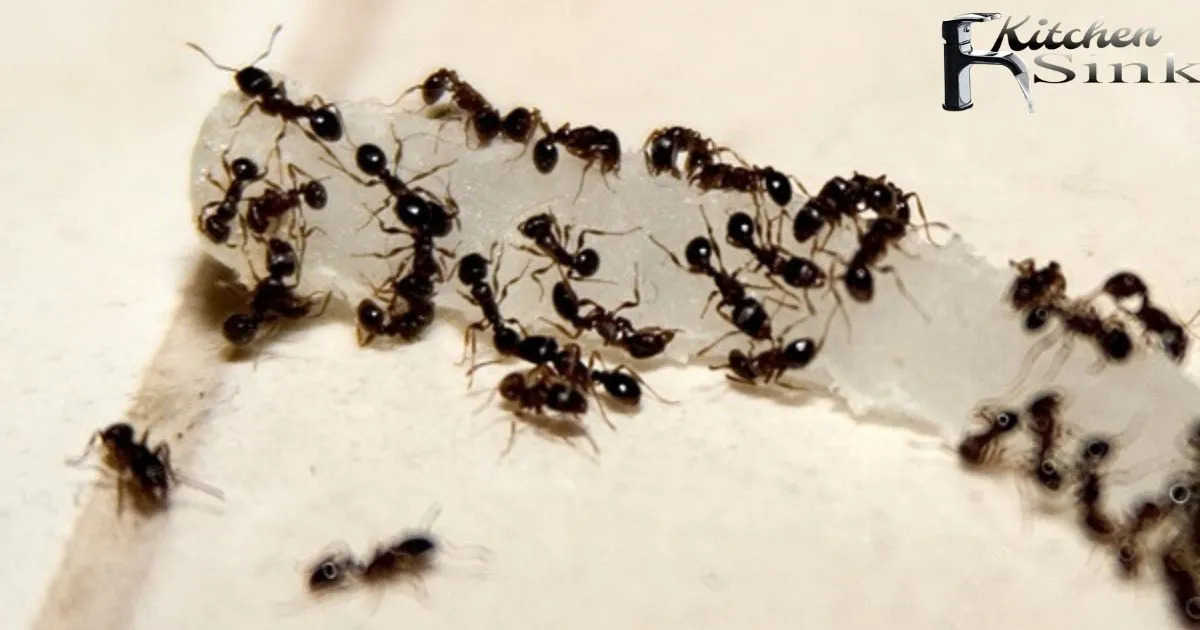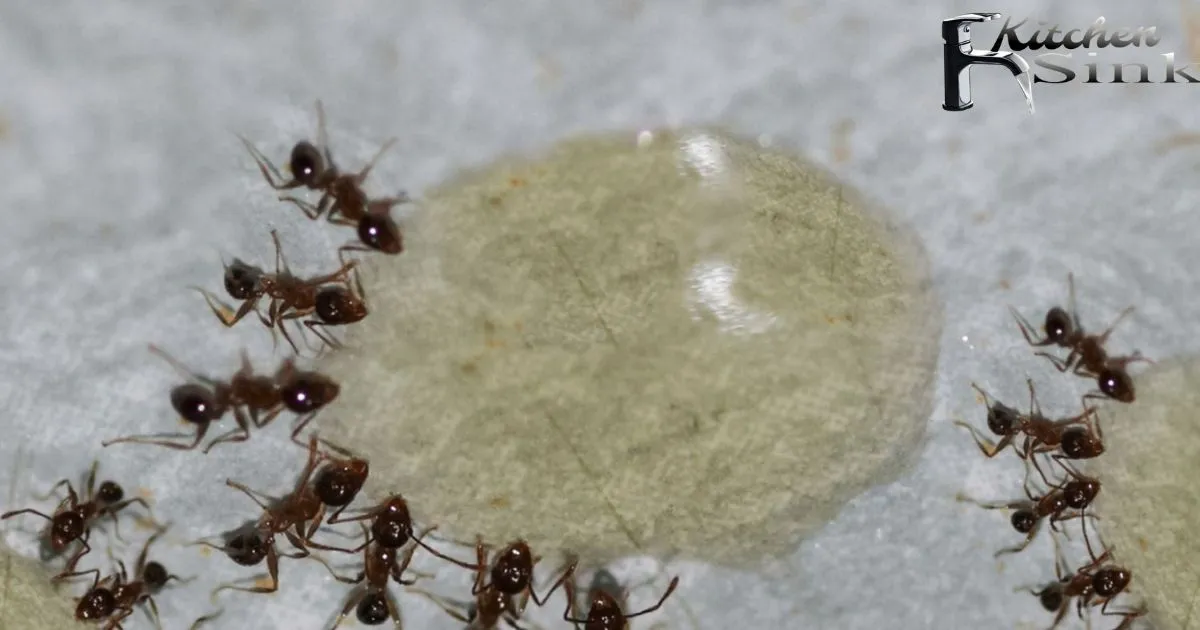Small ants around the kitchen sink can be a nuisance. They are attracted to crumbs and spills and come searching for sugar or greasy foods. If left alone, these tiny ants can quickly multiply into large colonies that invade pantries and other areas. Getting rid of them requires removing their food source and using natural repellents or ant baits.
Seeing a trail of tiny ants marching around your kitchen sink? Wondering how to banish them for good small ants don’t need much encouragement to move in. Just a few leftover crumbs or a sticky spot of juice or grease can attract them. Soon they’ll be crawling all over, searching for sweets and making themselves at home.
Ants are resourceful, so fully getting rid of small ants around the kitchen sink requires persistence. Start by removing all food sources like crumbs and spills so the ants have nothing to eat. Wipe down surfaces with vinegar or lemon juice. Place natural repellents like cinnamon, pepper, mint leaves, or cloves in problem areas.
Why Do Small Ants Infest Around The Kitchen Sink?
Small ants are attracted to the kitchen sink area because of the consistent moisture, water leaks, dripping faucets, damp sponges, and food particles that provide ideal conditions for them to thrive. Kitchen sinks provide both a water source and access to sugary and greasy food spills that ants feed on.
Attracts Small Ants To The Kitchen Sink Area
Ants are drawn to the kitchen sink as it tends to have small crumbs, grease, sugary spills, pet food, dirty dishes, water leaks, and damp areas that ants exploit for food and water. Kitchen sinks provide ideal sheltered spots, moisture, and bits of human food that attract colonies of small ants.
Small Ants Find Their Way To The Sink?
Foraging scout ants randomly explore an area and upon discovering a food or water source at the kitchen sink, lay down pheromone trails for other ants to follow. Ants communicate using chemicals and as more ants reach the sink, more pheromones accumulate, attracting trails of ants.
Small Ants Want Around The Kitchen Sink
Small ants infesting around a kitchen sink are seeking sources of food and water to take back to their colony. They want access to sugary spills, grease deposits, crumbs, pet food particles, water leaks, condensation, and moist areas that allow them to thrive.
Prevent Small Ants From Returning To The Kitchen Sink
To prevent small ants from continually accessing the kitchen sink, it’s important to fix any water leaks, clean all food debris, wipe up spills quickly, take out trash regularly, seal cracks ants use, and use ant repellents like cinnamon or vinegar around the sink area.
How To Remove Small Ant Trails Around The Kitchen Sink?
To enhance the effectiveness of this approach, ensure a thorough cleaning of the entire sink vicinity to eliminate any lingering traces of food or spills that might attract ants. For an added layer of prevention, consider pouring boiling water down the kitchen sink to deter ant activity and maintain a pest-free environment.
Wipe Out Small Ant Trails With Baking Soda
Sprinkling baking soda directly onto ant trails around the kitchen sink can disrupt pheromone scent trails. The baking soda absorbs and neutralizes ant pheromone odors. After sprinkling baking soda, wipe the area thoroughly with a damp cloth. The abrasive texture of baking soda also helps scrub away sticky residue.
Disrupt Ant Pheromone Trails With Vinegar
White vinegar is highly acidic which counteracts the pheromones in ant trails around the kitchen sink. Create a 50/50 vinegar water solution. Using a spray bottle, generously coat visible ant trails with the vinegar solution. This breaks down pheromones making trails undetectable to other ants.
Block Ant Trails To The Kitchen Sink For Good
Sealing any cracks or crevices around the kitchen sink that allow indoor access prevents ants from following established trails. Apply caulk around plumbing fixtures, along the backsplash, and wherever ants enter from. This physically blocks their path so new trails cannot form around the sink.
Keep Ants From Making New Trails To The Sink
Regular cleaning and removing food debris before ants detect it prevents new trails from forming around the kitchen sink. Immediately wipe spills, do not allow dirty dishes to sit in the sink, take out trash frequently, and sweep floors daily to leave nothing to attract ants.
Natural Ways To Repel Small Ants From The Kitchen Sink
There are several natural methods to repel small ants from congregating around the kitchen sink. Keeping the area clean and dry is crucial, as ants are attracted to moisture and food residue. Using natural repellents like vinegar, citrus peels, cinnamon, mint, cloves, and essential oils will also deter ants without the use of harsh chemicals.
Spices Repel Small Ants From The Kitchen Sink Area
Certain pungent spices are effective for repelling small ants from the kitchen sink area. Cinnamon, mint, cloves, black pepper, cayenne pepper, garlic, and onions have strong scents that ants dislike1. Sprinkling these dried spices directly around the sink drain or on ant trails provides a natural barrier. They can also be used to make homemade spray repellents.
Use Essential Oils As Repellents Around The Sink
5 tips for using essential oils as repellents around the sink:
- Mix peppermint, lavender, and lemon eucalyptus oils into a spray bottle with water. Spray around the sink, counters, cabinets, and along baseboards. These oils deter ants, flies, roaches, and other kitchen pests.
- Place cotton balls with citronella, lemon, and tea tree oils along the backsplash and edges of the sink. Refresh them weekly. The scent repels mosquitos, gnats, moths, and silverfish.
- Put a few drops of lavender oil onto sink drains and garbage disposals. Its scent deters fruit flies and ants that are attracted to moisture and food particles.
- Use basil, lemongrass, or catnip plants on the windowsill above the sink. As you brush against them, the scent is released which repels many flying insects.
- Diffuse lemon, peppermint, or eucalyptus oils in the kitchen daily. These repel a broad range of crawling and flying bugs that may enter near the sink.
Ants Avoid Peppermint Oil Around The Kitchen Sink
Peppermint essential oil is especially effective for repelling small ants. Studies show that ants detect and avoid the menthol in peppermint oil. Applying a perimeter of pure peppermint oil around the kitchen sink and drain entrance every few days will stop ants from crossing over to access food and water sources.
Herbs Keep Small Ants Away From The Kitchen Sink
Some fresh or dried culinary herbs can repel small ants around the kitchen sink, including mint, oregano, basil and rosemary. Rubbing their leaves releases the ants-repelling essential oils. Placing small dishes of these crushed herbs around the sink deters ants through both their strong scent and physical barrier. Bay leaves and cloves also effectively repel ants.
Poison Baits To Kill Small Ants Around The Kitchen Sink
Poison ant baits containing borax or boric acid are effective at killing small ants around the kitchen sink. The ants eat the bait, which contains a slow-acting poison, and bring it back to the nest to feed the rest of the colony. Over 1-2 weeks, this eventually kills off the entire ant colony. Popular ready-made baits are Terro Liquid Ant Bait and Raid Ant Baits. Alternatively, make your own using borax, sugar, and water.
Quickly Do Ant Baits Work Around The Kitchen Sink?
Ant baits start working in as little as 3 days, but can take 7-10 days to fully eliminate an ant colony around the kitchen sink. The bait must first attract scout ants, which then recruit more ants over subsequent days. The ants consume the bait and distribute the poison throughout the colony by feeding it to the larvae and queen. As more ants ingest and die from the poison, ant activity trails off until the colony is exterminated.
Where To Place Ant Baits Around The Sink Area?
Place small piles of ant bait around the sink, along ant trails, under the sink, and in sink cabinets where ants are active. Putting bait near their entry point, such as cracks along the counter, stops new ants entering. Baiting multiple locations ensures ants take the poison back to the central nest site. Check under appliances as ants may be nesting there.
How To Prevent Small Ants From Avoiding Baits Near The Sink?
Use multiple types of bait. Ants can become bait-shy after eating one bait repeatedly. Rotate protein and sugar baits.
Place baits along trails and nest entry points. Put baits where ants travel instead of right at the food source. This intercepts them before reaching the sink.
Use bait plus spray. A spray like Alpine WSG disrupts the colony and forces worker ants to take baits back to kill nestmates.
Apply boric acid powder along edges and cracks. This slow-acting stomach poison grooms off ants so they carry it back to the colony.
Here is a table summarizing approaches to make baits more effective:
| Method | How It Works |
| Use multiple baits | Rotating baits prevents bait aversion |
| Bait along trails | Intercepts ants before reaching food |
| Bait + spray | Disrupts colony forcing ants to take bait |
| Apply boric acid | Ants groom it off and carry back to nest |
Using a combination of these methods will prevent ants from simply avoiding a single bait placement near the sink. It gives a multi-pronged attack to force ants to take bait while eliminating food sources.
When Do You Need A Professional For Ants Around The Kitchen Sink?
If ant colonies persist after 2-3 weeks of using baits, it’s best to call a professional exterminator. Similarly, if you see large winged ants which indicate a mature nest, or ants are nesting in hard to access areas, professional-grade insecticide sprays or dusts may be required.
How To Keep Small Ants Away From The Kitchen Sink For Good
The most effective way to keep small ants away from the kitchen sink for good is to use ant baits. Place ant bait stations around the sink and along ant trails. The ants will be attracted to the bait, bring it back to the nest, and the bait will kill the colony within a few days.
For a natural option, create a borax ant bait by mixing borax, sugar, and water which also effectively kills ants. Keep using the baits for 2 weeks to fully eliminate newly emerging ants.
How To Find And Seal Cracks Ants Use To Access The Kitchen Sink
Check along the wall, under the sink, and around pipes where they enter the wall for any small cracks or holes. These provide entry points for ants to get to the sink. Seal cracks with caulk or spray foam to create a barrier. Place a line of cream of tartar around ant trails to stop their paths.
Best Way To Clean Sink And Counter To Deter Small Ants
The best way to clean the sink and counters is by using vinegar, which ants strongly dislike due to the strong scent. Wipe down all surfaces in the sink and counters with undiluted vinegar. You can also scrub the sink basin and garbage disposal with dish soap and a toothbrush before rinsing. This removes food residue and ant pheromone trails.
HOften To Take Out Kitchen Trash To Avoid Small Ants
Take out the kitchen trash daily to avoid attracting ants. Rotting food in the trash produces odors that draw ants. Storing trash in sealed bags before removing also prevents ants from directly accessing food waste.
Keep Ants Away From The Kitchen Sink In The Future
Always store food in airtight containers rather than openly on counters or in cabinets. Clean up any spills or crumbs immediately. Take out trash daily. Use ant baits periodically to kill off any new colonies that find their way inside.
Caulk or seal any new cracks that appear. Keep counters and sink clean by regularly wiping with vinegar. These measures deny ants access to food and water, causing them to avoid the kitchen sink area.
Frequently Asked Question
How do I stop ants coming to my kitchen sink?
Seal any cracks and crevices ants use to enter the home and access the sink.
What home remedies keep ants away from the sink?
Create a line of cream of tartar or cinnamon around the sink to deter ants.
Why do I see tiny ants in my kitchen sink drain?
Food particles and moisture attract scout ants that then recruit more ants to the sink.
How often should I take out the trash to prevent sink ants?
Take out all kitchen trash daily to avoid food odors that attract ants.
What cleaning products effectively repel ants from the sink?
Wipe down surfaces with undiluted vinegar which ants dislike due to the strong scent.
Conclusion
Getting rid of small ants around the kitchen sink requires using ant baits and keeping the area clean. Place ant bait stations containing borax or commercial ant bait around the sink and along ant trails. The ants will be attracted to the bait, bring it back to the nest, and the bait will kill off the colony. It also helps to find and seal any cracks ants use to enter.
To prevent small ants from returning, the key is denying them access to food and moisture. Always store food in sealed containers. Clean up any spills right away. Take out trash daily to avoid food odors. Use ant baits periodically to control new colonies. Keep the sink and counters clean by regularly using vinegar.



